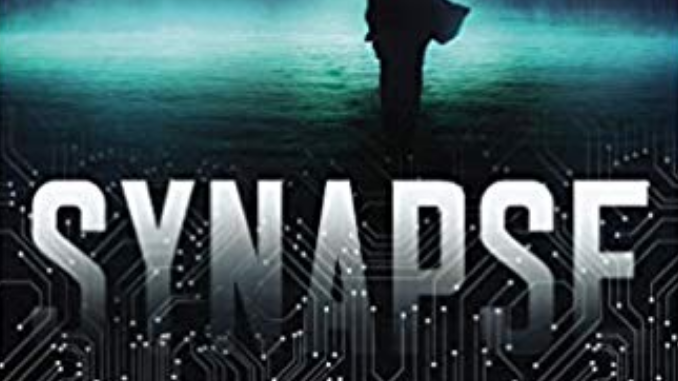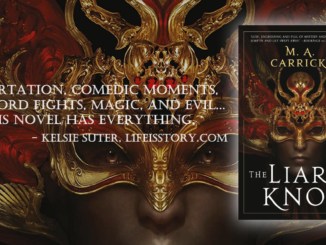
Also by this author: Broker of Lies, Fatal Domain, Fatal Domain, Rift
Published by Thomas Nelson on October 8, 2019
Genres: Fiction, Christian, Speculative, Thriller
Buy on Amazon
Goodreads

Thirty years in the future, when AI is so advanced that humans live side by side with cognizant robots called Artificials, Kestrel Hathaway must come to terms not just with what machines know, but with what they believe.
Soon after experiencing a personal tragedy, Kestrel witnesses a terrorist attack and is drawn into a world of conspiracies and lies that she and Jordan, her Artificial, have to untangle. With a second, more brutal attack looming on the horizon, their best chance of stopping it is teaming up with federal counterterrorism agent Nick Vernon.
But the clock is ticking—and all the while, Jordan is asking questions Artificials were never meant to ask.
Deftly weaving suspense and intrigue into a rich, resonant tale that explores faith and what it really means to be human, Steven James offers us a glimpse into the future and into our own hearts.
Synapse is an unforgettable, gripping story of dreams shattered, truth revealed, and hope reborn.
What does it mean to be human? It’s already a nearly impossible question to answer, one that ranges wildly depending on the social and religious background of the one answering.
Is it a matter of intelligence? The Artificials are smarter.
Is it a matter of emotion? The Artificials can simulate it.
Is it a matter of biology? The newer Artificials are real enough they look and feel human.
Is it a matter of having hope? They’ve been designed for that as well.
Humanity has created Artificials in their own image and now must reckon with the consequences. Yet, most don’t. Most have accepted the Artificials into every aspect of their lives—as their nannies, postmen, police, and even novelists and artists. AI is no longer just about doing the rote and routine. Neural networks have allowed Artificials to process the whole of human history and become creative and self-aware. They can even replace the dead.
Or at least, that was Jordan’s purpose. Kestral’s brother—a bigwig at Terabyne, the company that creates the Artificials—had generously given Jordan to Kestral in the wake of the stillborn death of her child. She didn’t want him. She wanted her daughter. But she didn’t want to fight her brother. And maybe a companion wouldn’t be so bad. Someone with whom she could share the loneliness and grief.
But as this psychological drama unfolds, a political thriller begins to play out over the top of it. Not everyone welcomes their robot overlords. A terrorist organization known as the Purists have set out to stop Terabyne at any cost and when Kestral gets too close to one of their attacks, she becomes both the victim and the accused. She and Jordan get drawn into a world of conspiracy, where nothing is quite as it seems.
As they get closer to understanding the Purist’s plot—and Terabyne’s dark secrets—Jordan finds himself increasingly confronted with his lack of humanity. Is he human? Is there life after death for him? Is there a God for him to worship? Can an Artificial be saved?
My problem with this book is that it’s too good. I wanted everything to go deeper, to take longer, to be told in more richness and depth, to be explored further. No sooner would I be set in my philosophical musings of humanity and mortality than I would be thrown into another firefight or unforeseen plot twist. I would settle into this, gain my bearings, and hunker down into the thriller, then turn the page and be confronted by deep theological questions of the soul.
I needed more time in this world. I needed more time in this story. The world of Synapse and the questions that build out from it form a structure that must be parsed and picked at more deeply than one novel can give. Synapse is the foundation, and it’s incredible, but it demands to be built upon.
Just like Orson Scott Card wowed the world with Ender’s Game and is still exploring that world thirty-five years later, just like Isaac Asimov spent most of his career expanding upon the world creating in I, Robot, the world created by Steven James in Synapse has the possibility of being generational fiction. And who knows, thirty years from now the things he began to write may be coming true. This is as good as the science-fiction greats of Card, Asimov, and Wells—if only he gives us more.
Any criticism I have of this book is some form of “things happened too fast.” A new character, a new twist, the amount of setup. I can only hope that James plans on settling in and truly trying to satisfy. I feel like I’ve been presented the best meal I’ve ever seen only to be allowed but one bite. I need more. And if James doesn’t do it, I may have to start writing Synapse fan-fiction.



